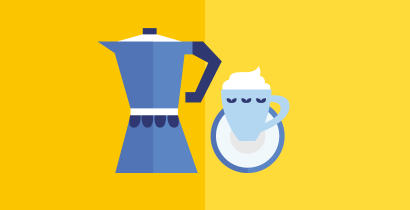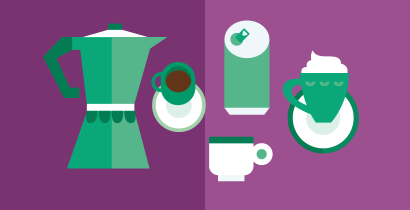What does caffeine do to our body?
Last Updated : 31 July 2024Key takeaways:
- Caffeine is a natural stimulant found in coffee, tea, cacao, kola nuts, and guarana, and can also be made synthetically.
- Caffeine can boost alertness and attention by blocking adenosine receptors, increasing neurotransmitter activity, and stimulating the heart, with effects lasting several hours.
- Intakes of caffeine of up to ~400 mg/day (with maximum 200 mg per single dose) are generally safe and may even protect heart health, though people with hypertension or a predisposition to hypertension may see slight increases in blood pressure.
- Evidence doesn't support a clear link between caffeine and migraines or diarrhoea.
- Caffeine intakes of up to 450 mg/day don't cause dehydration; coffee and tea contribute to our daily fluid intake.
- Regular caffeine consumption may lead to dependence with withdrawal symptoms when stopping consumption. Moderating your intake helps prevent this.
Caffeine is a natural stimulant that belongs to a class of compounds called xanthines. The most well-known source of caffeine is the coffee bean, the seed of the Coffea plant. Other natural sources include the tea leaf, kola nut, cacao pod, and guarana berries. Caffeine can also be produced synthetically in laboratories. Synthetic caffeine may be used in products such as energy drinks, supplements, and cosmetics. People commonly consume caffeine to relieve or prevent drowsiness and to improve concentration and focus.
How does caffeine work ?
Due to its ability to dissolve in both fat and water, caffeine can easily cross the blood-brain barrier .1Once it has reached the brain by traveling through the bloodstream, it interacts with specific sites in the brain known as adenosine receptors.1 Adenosine is a neurotransmitter that promotes sleep and relaxation by slowing down nerve activity. Caffeine binds to the adenosine receptors without activating them, effectively blocking the action of adenosine, and leading to increased neuron firing in the brain. This increased neural activity triggers the release of other neurotransmitters such as dopamine and norepinephrine, which enhance arousal, alertness, and attention. Caffeine also stimulates deeper breathing by enhancing the brain's response to carbon dioxide.1
Adenosine receptors are not only found in the brain but also throughout the body, including in the heart. When caffeine interacts with these receptors, it can cause the heart to pump more vigorously and at a faster rate.1 Additionally, caffeine prompts the body to release adrenaline, which further influences the heart's pumping strength and rate.1 The increased heart rate and blood flow contribute to the feeling of alertness and wakefulness.
To understand how long these effects might persist, it is useful to consider the half-life of caffeine, which is about 5 hours.1 This half-life indicates that, on average, it takes 5 hours for the body to reduce the caffeine concentration by half. Therefore, the stimulating effects of caffeine can be sustained over several hours, gradually diminishing as the caffeine is metabolised by the body.
Is caffeine bad for you?
Generally, small to moderate amounts of caffeine, ranging from 20 to 200 mg per dose, are often associated with feelings of improved mood, energy, alertness, and sociability. However, larger doses may lead to feelings of anxiety, restlessness, and digestive discomfort.2 People react differently to caffeine based on factors such as genetics, tolerance, and overall health. Some individuals may be more sensitive to caffeine's effects, while others can tolerate higher doses without adverse reactions.2
Can caffeine cause palpitations, chest pain, or high blood pressure?
Current research suggests that consuming a moderate amount of caffeine (approximately 400–600 mg per day) is not linked to higher risks of cardiovascular conditions such as arrhythmia, heart failure, or significant blood pressure fluctuations among regular caffeine users.3 In fact, in healthy populations without pre-existing cardiovascular issues, moderate caffeine intake may decrease the risk of cardiovascular disease and potentially offer protective effects.3
However, it is worth noting that populations with a predisposition to hypertension or those already diagnosed with hypertension may be more susceptible to certain effects of caffeine.3 For instance, some studies report that individuals with pre-hypertension or hypertension experience acute and small sustained increases in blood pressure after consuming caffeine in the range of 100 to 400 mg per day, compared to those with normal blood pressure.3
Can caffeine cause migraines?
While caffeine has long been associated with migraines, its impact on headaches remains unclear. For a small percentage of individuals who suffer from migraines, both, consuming and abstaining from caffeine have been identified as potential triggers.4 There is a lack of conclusive evidence confirming that caffeine directly causes migraines.4 Since no provocation studies on the topic have been reported until now, the relationship between caffeine and migraines is not fully understood.4
Can caffeine cause diarrhoea?
No, caffeine is not known to cause diarrhoea. However, based on an experiment involving caffeine-containing coffee, we know that caffeine stimulates colonic motor activity, leading to some individuals feeling the urge to defecate after consuming it.5 The magnitude of this stimulation was found to be comparable to a regular meal, 60% stronger than water, and 23% stronger than decaffeinated coffee.5
Does caffeine dehydrate you?
Theoretically, caffeine can negatively impact hydration by increasing blood flow to the kidneys and preventing the re-absorption of certain minerals, leading to increased water expulsion.6 Some evidence suggests that caffeine may prompt the need to urinate by stimulating the bladder's muscles.6 Given that studies on this topic have primarily used high caffeine doses in capsules or involved animal models, the impact of high caffeine doses on dehydration in humans is not clearly understood.6 However, it is widely agreed that low to moderate caffeine intake (up to 450 mg per day) does not negatively impact hydration.6 Caffeine-containing beverages such as coffee and tea can be counted as part of our daily fluid intake.
Is there such a thing as caffeine withdrawal?
With regular consumption, a physical dependence on caffeine can develop, demonstrated by the emergence of withdrawal symptoms when cutting down or stopping caffeine intake. Research supports that this dependence may be due to the body's increased sensitivity to adenosine, which caffeine blocks when consumed.2 Withdrawal symptoms from caffeine include a wide range of uncomfortable effects such as headache, fatigue, reduced energy and alertness, sleepiness, dissatisfaction, low mood, difficulty focusing, and irritability.2
These withdrawal symptoms typically start between 12 to 24 hours after stopping caffeine, with the worst effects felt between 20 to 51 hours and can last for a couple of days up to about a week.2 Taking caffeine again can quickly alleviate these symptoms. The desire to avoid these unpleasant withdrawal symptoms contributes significantly to why people continue to consume caffeine.2 Moderating one’s caffeine consumption is the best-known way to prevent dependence and consequent withdrawal effects.
Summary
Caffeine, a widely consumed natural stimulant found in coffee, tea, and other sources, enhances focus and alertness by blocking adenosine receptors in the brain. Its effects can last up to several hours due to its 5-hour half-life. While moderate intake improves mood and energy, high doses of caffeine may lead to negative effects such as anxiety, restlessness, digestive issues, and high blood pressure in people with hypertension. However, drinking up to 7 cups of black tea or 4 cups of filter coffee per day, which is equal to about 400 mg of caffeine, is considered safe for healthy adults.7
References
- Evans, J., Richards, J. R., & Battisti, A. S. (2022). Caffeine. In StatPearls. StatPearls Publishing.
- Juliano, L. M., & Griffiths, R. R. (2004). A critical review of caffeine withdrawal: empirical validation of symptoms and signs, incidence, severity, and associated features. Psychopharmacology, 176, 1-29.
- Turnbull, D., Rodricks, J. V., Mariano, G. F., & Chowdhury, F. (2017). Caffeine and cardiovascular health. Regulatory Toxicology and Pharmacology, 89, 165-185.
- Nowaczewska, M., Wiciński, M., & Kaźmierczak, W. (2020). The ambiguous role of caffeine in migraine headache: from trigger to treatment. Nutrients, 12(8), 2259.
- Rao, S. S., Welcher, K., Zimmerman, B., & Stumbo, P. (1998 ). Is coffee a colonic stimulant? European journal of gastroenterology & hepatology, 10(2), 113-118.
- Ruxton, C. H. S. (2008). The impact of caffeine on mood, cognitive function, performance and hydration: a review of benefits and risks. Nutrition Bulletin, 33(1),
- EFSA Panel on Dietetic Products, Nutrition and Allergies (NDA). (2015). Scientific Opinion on the safety of caffeine. EFSA Journal, 13(5), 4102.



